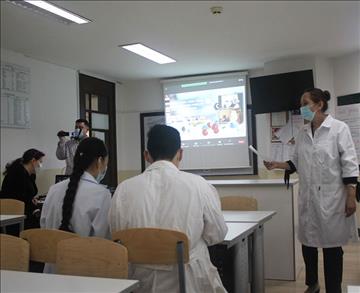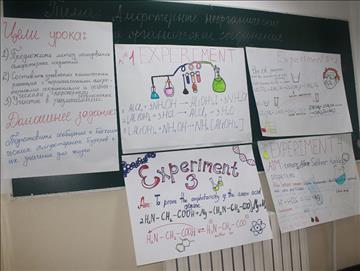Science has no boundaries: Students at Aga Khan School, Osh, partake in online international chemistry class
As part of the Aga Khan Education Service’s strategic initiative to enhance the Science, Technology, Engineering and Mathematics (STEM) offering at the Aga Khan School, Osh (AKSO) in Kyrgyzstan, the team is working with several international subject experts. Under this initiative, Dr. Sadru Damji, a volunteer based in Toronto, Canada led an interactive and exciting online chemistry class in May 2021 for a group of grade 11 students.


The online chemistry lesson was facilitated by AKSO teachers, delivered in English and involved live discussions between Dr. Damji, students and teachers. The lesson served as a joint research project between students, teachers and Dr. Damji, where students were asked to experimentally investigate amphoteric inorganic and organic compounds and present their findings to each other. During the practical work, students proposed a method to investigate amphoteric compounds and deduced the chemical equations for the reactions conducted. Students illustrated, through research, real-life application and the cross-curricular link of amphoteric compounds and their importance in buffer actions in the human body.
One of the students, Turdiev Radmir noted, "I realise that chemistry is our whole life, but the knowledge gained today strengthened my understanding of its deeper [meaning]." Another student, Ten Daniel, said, “When conducting experiments, I felt like I [was] a real scientist exploring new, unknown ideas. The online class was very good, especially the experiment and the guidance and support provided from teachers and Dr. Damji.”
During the experiment, students demonstrated excellent skills in working with equipment and reagents while following safety rules and proper instructions for conducting experiments. Dr. Damji said he was “very pleased” with the students’ enthusiasm for learning. He was particularly impressed with the students’ participation in the final reflection component of the investigation, including their ability and willingness to ask meaningful questions. “They worked well in small groups, grasped new scientific concepts and were open to new ideas,” he said.
The lesson motivated students to continue further their study of chemistry solutions and mechanisms, such as buffer systems. Student Dilorom Abdurakhmanova explained, “This lesson was unusual [because it was online], but at the same time very exciting. I plan to continue [to] study the role of buffer systems in the human body."
The online class was successful thanks to the previous experience of Dr. Damji of working both face to face and online with students in different countries. His experience with the International Baccalaureate (IB) allowed him to define the framework for this online class and plan and deliver the class using research-based problem-solving. The school’s science teachers plan to continue similar investigations in the next academic year in order to give our students the opportunity to learn more, broaden their horizons and dive deeper into the world of science and technology.
Photos (top to bottom):
- Students participated in hands-on experiments facilitated by their teachers.
- Local health and safety protocols were followed during the class.
- A selection of posters in both English and Russian created by the students.

